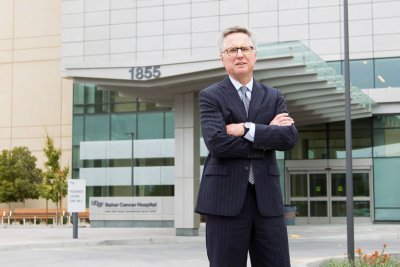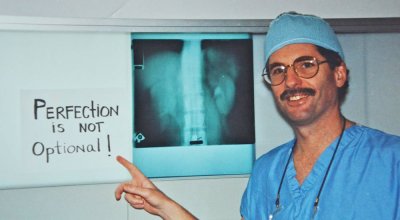

Peter Carroll, MD, MPH, interim director of the UCSF Helen Diller Family Comprehensive Cancer Center, stands outside the new UCSF Bakar Cancer Hospital at Mission Bay. Photo by Susan Merell

Peter Carroll as a resident at UCSF in the early 1980s. In the 30 years he's been here, Carroll says he's seen dramatic advances in the quality and precision of cancer care. Photo courtesy of Carroll.
When urologist Peter Carroll, MD, MPH, did his residency at UCSF 30 years ago, cancer was “a word that was whispered,” a knowledgeable patient was someone who just followed doctor’s orders and oftentimes a diagnosis wasn’t made until disease was advanced.
That’s all changed with the introduction of routine use of imaging and other screening practices, in which, for example, an asymptomatic small kidney cancer might be spotted in a patient with suspected gallstones, said Carroll, interim director and head of the prostate cancer program at UCSF Helen Diller Family Comprehensive Cancer Center and associate dean of the UCSF School of Medicine.
Other pivotal advances include the development of new classes of treatments that has meant some cancers could be successfully managed as a chronic disease; and the advent of the Internet and social media providing patients with a wide window into information about their condition and prospective treatments.
“We’re witnessing a sea change in the way we respond to cancer. We’ve found that surveillance rather than treatment might be the best strategy for some low-grade cancers, while using novel therapy or combinations of treatments might offer the best chance for long-term survival for patients with some advanced cancers,” he said.
From Microscopes to Molecules
Carroll said clinicians are also learning that “treatment isn’t just determined by grade, staging, size of tumor, or even its site of origin and what it looks like under a microscope in some cases.”
“Advances in molecular biology, genomics and related technologies have led to a greater understanding of cancer at the molecular level,” he noted. “If we identify the genetic and molecular variations in each patient’s cancer cells, we can tailor treatments that target the molecular underpinnings of each patient’s disease.”
Embodying this evolution in cancer management is the new 70-bed UCSF Bakar Cancer Hospital, opening Feb. 1, 2015, at Mission Bay. It will be right down the street from the UCSF Helen Diller Family Cancer Research Building, dedicated to uncovering the basic biological mechanisms of cancer.